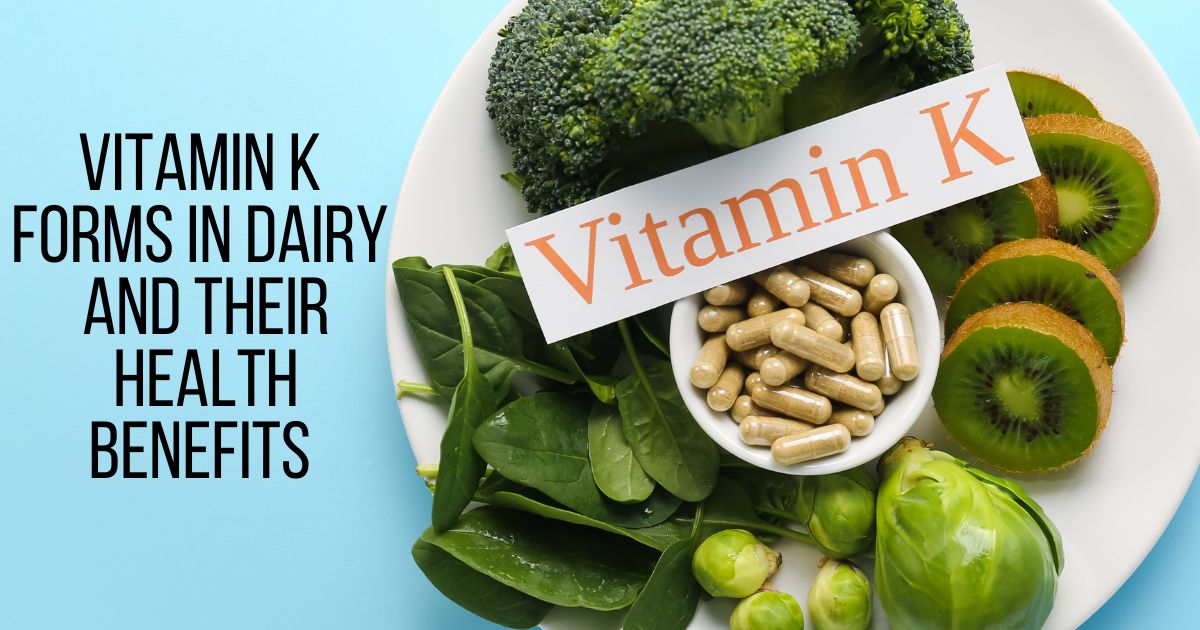Vitamin K, a crucial fat-soluble vitamin, plays an indispensable role in our health, particularly in blood clotting, bone metabolism, and cardiovascular health. While many are familiar with Vitamin K’s general benefits, the specific forms of Vitamin K found in dairy products, along with their distinct health advantages, are less widely known. This article delves into the various forms of Vitamin K present in dairy and explores their significant health benefits.
Understanding Vitamin K: The Basics
Vitamin K is primarily known for its essential function in blood coagulation. Without adequate Vitamin K, our body’s ability to form blood clots would be severely impaired, increasing the risk of excessive bleeding. However, the role of Vitamin K extends beyond just blood clotting. It is vital for bone health, aiding in the binding of calcium to the bone matrix, and has been linked to cardiovascular health by preventing arterial calcification.
There are two primary natural forms of Vitamin K: Phylloquinone (Vitamin K1) and Menaquinones (Vitamin K2). Vitamin K1 is predominantly found in green leafy vegetables and is the most common form consumed in the Western diet. On the other hand, Vitamin K2 is present in animal products and fermented foods, with dairy products emerging as a significant source.
Vitamin K in Dairy: Unveiling the Varieties
Dairy products are celebrated for their calcium content, essential for bone health, but they also offer a valuable source of Vitamin K, particularly Vitamin K2. The presence of Vitamin K in dairy varies with the fat content of the product, with full-fat dairy products typically offering higher levels of this nutrient than their low-fat or fat-free counterparts.
Research highlighted by the Tufts Now article has brought to light the significant presence of various forms of Vitamin K in dairy products available in the United States. This study revealed that dairy items, including milk, yogurt, and cheese, contain appreciable amounts of Vitamin K1 and K2, with concentrations varying by the fat content of the dairy product.
The Health Implications of Vitamin K2 from Dairy
The menaquinones, or Vitamin K2 forms found in dairy, are particularly noteworthy for their health implications. Unlike Vitamin K1, which is rapidly cleared from the body, certain forms of Vitamin K2 have longer half-lives, allowing them to confer more sustained benefits, particularly for bone and cardiovascular health.
Vitamin K2’s role in bone health is well-documented. It aids in the activation of osteocalcin, a protein essential for binding calcium to the bone matrix, thereby enhancing bone strength and reducing the risk of fractures. Furthermore, Vitamin K2 has been associated with cardiovascular benefits. It helps prevent the calcification of arteries, a key risk factor for cardiovascular diseases.
Incorporating Vitamin K-rich Dairy into Your Diet
In light of these benefits, incorporating Vitamin K-rich dairy products into one’s diet can be a strategic move for those looking to optimize their Vitamin K intake. Full-fat dairy products, in particular, can be excellent sources of this vital nutrient, contributing to bone health and cardiovascular well-being.
FAQs
- What specific forms of Vitamin K are found in dairy products?
- Dairy products primarily contain Phylloquinone (Vitamin K1) and various forms of Menaquinones (Vitamin K2). The specific types of Vitamin K2 in dairy include MK-4, MK-7, MK-8, and MK-9, with their availability depending on the type of dairy product and its fat content.
- How does the fat content in dairy influence Vitamin K levels?
- The fat content in dairy significantly impacts the concentration of Vitamin K, particularly Vitamin K2 forms. Full-fat dairy products tend to have higher levels of Vitamin K2 compared to low-fat or fat-free options. This is because Vitamin K is a fat-soluble vitamin, and its presence correlates with the fat content of the dairy product.
- Can consuming Vitamin K2 from dairy improve bone health?
- Yes, consuming Vitamin K2 from dairy has been linked to improved bone health. Vitamin K2 aids in the activation of osteocalcin, a protein crucial for incorporating calcium into the bone, thereby enhancing bone strength and reducing fracture risks.
- What are the cardiovascular benefits of Vitamin K2 found in dairy?
- Vitamin K2 plays a role in preventing the calcification of blood vessels, thereby contributing to cardiovascular health. By inhibiting the buildup of calcium in the arteries, Vitamin K2 helps maintain arterial flexibility and supports heart health.
- Is it necessary to consume dairy to get enough Vitamin K?
- While dairy is a good source of Vitamin K, especially K2, it’s not essential to consume dairy to meet Vitamin K needs. Other sources include green leafy vegetables (for Vitamin K1) and fermented foods (for certain forms of Vitamin K2). However, for individuals who consume dairy, it can be a significant source of this nutrient.
Understanding the Impact of Dairy-Derived Vitamin K
- The role of dairy-derived Vitamin K extends beyond just bone health; it also has implications for blood health and potentially, anti-inflammatory processes.
- Including a variety of dairy products, such as cheese, yogurt, and milk, can diversify the forms of Vitamin K in your diet, providing a broader range of health benefits.
The exploration of Vitamin K forms in dairy sheds light on the nuanced ways our diet can influence health, particularly bone density and cardiovascular wellness. By understanding the types of Vitamin K in dairy and their health impacts, individuals can make informed choices about their dairy consumption and overall diet strategy.
